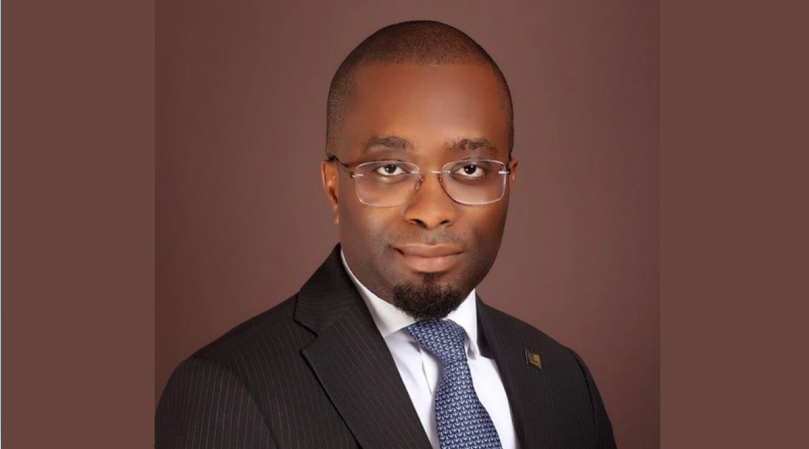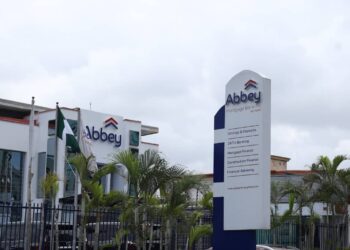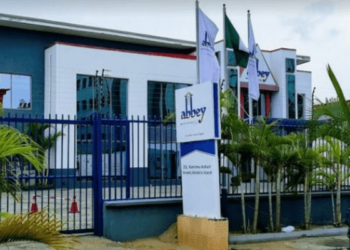Abbey Mortgage Bank Plc is one of the largest and most profitable Primary Mortgage Banks in Nigeria, focused on providing well-structured mortgage options as well as other financial and advisory services.
In this interview with Nairametrics, Mobolaji Adewumi, Managing Director, Abbey Mortgage Bank Plc takes us through his journey in the financial services sector, through to being appointed to head one of Nigeria’s oldest mortgage banks.
He also talks about the impact of the bank on the mortgage industry in Nigeria, as well as the plans for the future. Excerpt:
Who is Mobolaji Adewumi?
I am a finance professional with over 14 years’ experience across 2 tier 1commercial banks and one of the big four accounting consulting firms in Nigeria. My work experience also includes 6 years of service as a soldier in the Nigerian Army.
My aspiration has always been to be a visionary leader within the Financial Services Industry.
I am also a family man, blessed with an amazing partner and two lovely children.
Take us through your journey to becoming the MD of Abbey Mortgage Bank?
I have always been interested in Finance. This interest inspired me to study Management and Accounting at the Obafemi Awolowo University. I got qualified as a chartered accountant in 2007 on completion of the Association of Certified Chartered Accountants (ACCA) professional qualification exams.
I started my professional career at KPMG Nigeria (an international firm of chartered accountants) in 2006. In 2009, I moved to the United Bank of Africa (UBA) as a Senior Financial Analyst. During my stay at UBA, I manned a couple of portfolios (reporting to the CFO) which included: Head of Finance for Institutional Banking and Non-Bank Subsidiaries and later Head of Finance for UBA Africa.
My passion for business management led me to proceed to a Business School for my MBA. I resigned from UBA in 2011 to commence the MBA (Specialising in Finance) program at Judge Business School, the University of Cambridge as a Leventis Scholar.
In 2012, after the completion of my MBA program, I ventured into specialized banking by joining Aso Savings and Loans Plc as the Special Adviser to the MD/CEO. I later joined First Bank of Nigeria Limited as the Special Assistant to the Managing Director/ Chief Executive – Dr. Adesola Kazeem Adeduntan.
In April 2019, I left First Bank of Nigeria Limited to take up the role of the Executive Director, Finance of VFD Group PLC for about a year before taking on a new challenge in Abbey Mortgage Bank PLC as the Executive Director, Finance and Administration.
The fortunate and welcomed appointment of our immediate past MD/CEO Mr Madu Hamman as the MD/CEO of First Mortgage Bank Nigeria (FMBN) gave me the unique opportunity to be appointed as the Ag. MD/CEO of Abbey Mortgage Bank.
How has being at Abbey Mortgage Bank impacted your career?
The Mortgage Banking industry is not entirely new to me, having worked three years in Aso Savings PLC, I understood the peculiar challenges facing the mortgage sub-sector. The experience gained working with big Institutions like KPMG, UBA and FirstBank were also valuable in the two roles I have manned in Abbey.
I resumed at Abbey at a very critical phase in the life of the institution. Firstly, it was at a time the Founder Mrs Rose Okwechime was retiring from her role as the MD of the Mortgage Bank after 28 years of meritorious service. Secondly, it was at the phase when critical decisions needed to be taken on the financial position and future of the Institution.
Resuming at Abbey at the time I did and in the capacity of my position meant I had to be actively involved in providing a guide to the Board of the Directors of the Bank on what needed to be done to reposition the Mortgage Bank for growth, in getting the buy-in of the major stakeholders including the regulators and in driving the implementation of the agreed initiatives.
Abbey provided me with the opportunity to be in the driving seat of a publicly quoted Financial Institution. The exposure offered by the Institution has helped to further develop key management skills and provided an opportunity to directly interact with key stakeholders of the Mortgage Bank.
What strategy did you deploy as an organization to manage your transformation journey?
The strategies deployed can be broadly categorized into four pillars:
People: We assembled the right team and made a conscious effort on training the existing staff. You know as they say, a chain is only as strong as its weakest link.
Technology: We invested in the right technology and leveraged on key partnerships to unlock synergies within our ecosystem.
Structures: We put adequate structures in terms of teams, controls and processes that unlocked potential for growth and profitability.
Performance management: We instituted a system of accountability, setting of KPIs and performance monitoring.
Risk Management: We instituted a robust Enterprise Risk Management framework
How has Abbey Mortgage Bank Impacted the Industry?
Abbey Mortgage Bank is one of the oldest Mortgage Banks in the Industry. The Mortgage Bank began operations in 1993 and in the past 30 years, Abbey has supported a lot of Nigerians in owning their personal homes.
In the area of provision of housing stock for potential off-takers, Abbey has worked with several Developers by providing construction finance and other support towards delivery of houses to homeowners. Over the last 30 years, we have contributed to several communities across the country through the Mortgage Bank’s various CSR initiatives.
Abbey carried out a rebranding exercise in 2021 which included changing the Mortgage Bank’s logo and communicating the Mortgage Bank’s revised vision, mission and values.
The strategy over the last 2 years has been deliberate and targets repositioning the Institution to be a leader in the Mortgage Banking space. The recently released financial results for the Mortgage Bank evidenced that the transformation walk embarked on two years ago has started to yield the required results. We remain committed to enhanced value creation for the Mortgage Bank’s shareholders and other stakeholders. The bank also won the award for the most innovative mortgage bank last year.
What are the plans for the Abbey @30 celebrations?
As an institution that has withstood the varying economic downtimes and has remained strong and vibrant, our 30 years is worth every bit of celebration. For us, we will be reiterating the essence of our new brand identity which we redefined in 2021. We have mapped out a series of activities to reinforce our leadership position, our CSR activities which will include school rehabilitation, a walkathon promoting mental health among other initiatives; our focus on these areas is that of our entrenched belief in building dreams which can only occur with a balanced mental health; as such, this anniversary serves as another opportunity to give back to our society and showcase the true spirit of Abbey.
In addition, we will be hosting a breakfast panel to lead the discussion centred around mortgage and the future of mortgage in Nigeria, leveraging technology, this will be a gathering of different high-profiled stakeholders in the mortgage sector value-chain. We want to reinforce the conversation of nation-building through this session.
Also, as a brand that understands its role as one of the providers of the basic needs of humanity, we are geared to make this a very insightful and thought-provoking session. Finally, the anniversary will include the recognition and celebration of the employees who have been the bedrock of our existence these past 30 years. We are truly excited for the plans ahead.
What do you think are the biggest challenges the mortgage industry faces?
The industry is faced with several challenges, the major challenges include:
Asset-Liability Maturity Mismatch- Mortgage Banks are required to create long-term assets (mortgages) but they mainly rely on short-term deposit liabilities for the creation of mortgages that typically should span 10 to 20 years. The establishment of the Nigeria Mortgage Refinance Company (NMRC) has provided a platform for Mortgage Banks to refinance the mortgages created, as more Mortgage Banks create qualifying assets that meet the NMRC criteria for refinancing, the liquidity pressure associated with mismatch will be further eased. In addition, mortgage banks should also develop capacity to access funding from the capital market through bond issuance.
Difficulty in accessing land and securing title to land due to shortcomings on the provisions and implementation of the land use act of 1978 continue to remain a challenge for players in the industry.
The weak Foreclosure laws hinder the enforcement of mortgage security when customers default, this is partly responsible for the high non-performing loans recorded by the PMBs.
How does Abbey intend to weather these challenges?
The Mortgage Bank keeps exploring alternative channels to access longer-term funding. An example is the capital raise that was completed last year. We are also in discussion with Institutions that either directly invests long-term funds or provide avenue to access such funds through the capital market.
We have in place a robust enterprise risk management framework which enables us to individually profile the risk exposure of every borrowing customer and put the appropriate mitigating plans. Also, there is a dedicated loan monitoring department and red flags triggers which give us early warning signs when the customer is about to default. All of these help us limit possible defaults that will necessitate recovery action.
The Bank is also very active with groups and associations pushing for a continuous review of some of these laws
What are the next steps for Abbey Mortgage Bank?
At Abbey, our vision is very clear. We want to be the leading mortgage bank out of Africa and all efforts are channelled towards ensuring that we achieve this vision.
Our focus over the next 1 year is to continue to build an enhanced platform that will support the creation of value for our esteemed shareholders and other stakeholders. We will continue to develop innovative financial solutions that will allow our clients to achieve their objectives of owning their homes and making their investments.
We believe there is a significant opportunity in the subsector, and we are willing to stay in the forefront, working with all stakeholders to further develop the sector and increase its contribution to the overall economy of the country.
In conclusion, we intend to expand the balance sheet, increase our impact in supporting developers and home buyers and ultimately, increase our shareholders’ wealth.























Well done Bolaji, very proud of you
By God grace, we have seven suggestions to these problem:
1. motorcycles with doors : it has been an issue to tricycles(keke), bad weather has limited them to operating at full potential.
2. Tracking ID: Every living thing has a heart and without the heart, the body system can not function. A tracking I.D will serve in that use
3. Increased number of seats on the tricycle(keke): I believe it will help boost the economy of Nigeria.
4. installation of min fans on the tricycle(keke): This will help in the suctions of air into the tricycle(keke).
5. Medical and Body Sensor: It will help to bring medicine closer to the people without putting fear in them. It will help to detect and provide service.
6.Voice map assistance and surveying camera: These will help to put the police force closer to the passenger and voice map assistance surveying camera will serve as an aid to guide the driver and also put the police force on alert.
7. Driver Fingerprint : This will help reduce occurrences of stolen vehicles.
for more info: click rentologtechnologyltd.simdif.com
JESUS LOVES YOU.